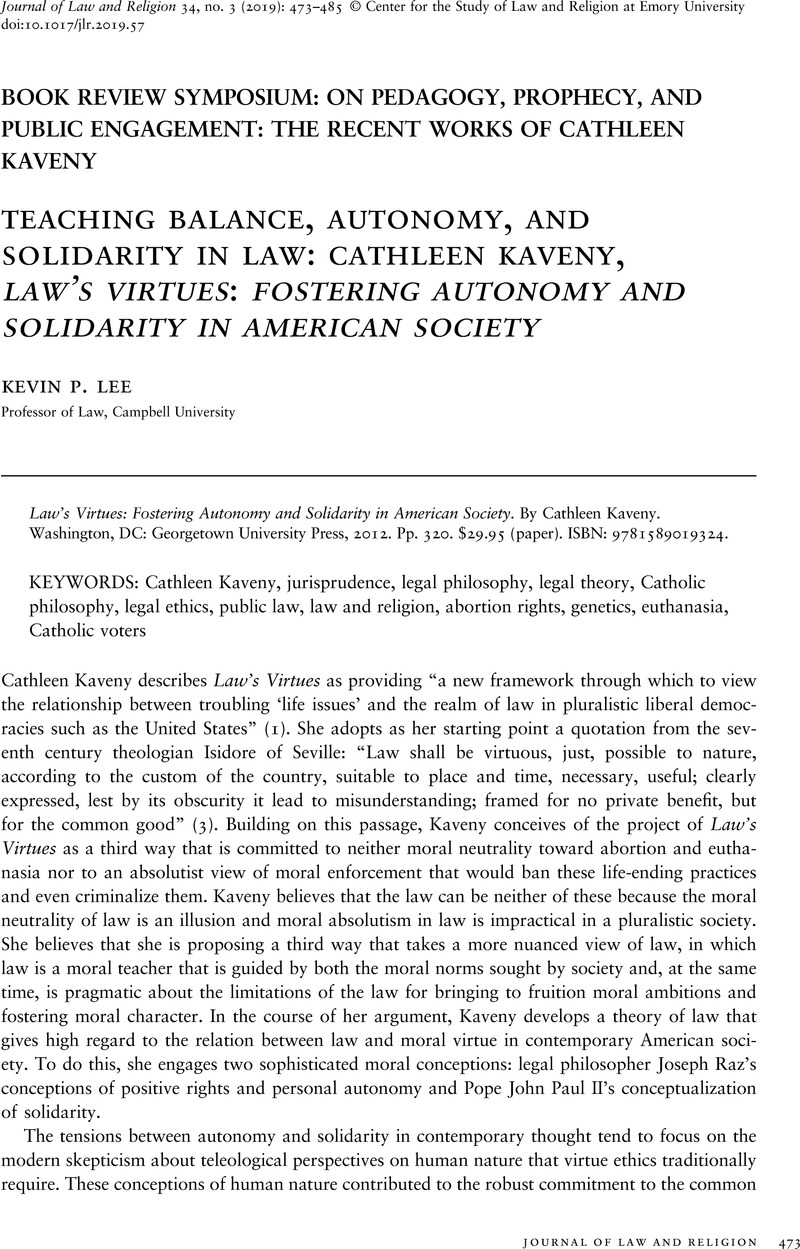No CrossRef data available.
Article contents
TEACHING BALANCE, AUTONOMY, AND SOLIDARITY IN LAW: CATHLEEN KAVENY, LAW'S VIRTUES: FOSTERING AUTONOMY AND SOLIDARITY IN AMERICAN SOCIETY - Law's Virtues: Fostering Autonomy and Solidarity in American Society. By Cathleen Kaveny. Washington, DC: Georgetown University Press, 2012. Pp. 320. $29.95 (paper). ISBN: 9781589019324.
Review products
Published online by Cambridge University Press: 24 February 2020
Abstract

Keywords
- Type
- Book Review Symposium: On Pedagogy, Prophecy, and Public Engagement: The Recent Works of Cathleen Kaveny
- Information
- Copyright
- Copyright © Center for the Study of Law and Religion at Emory University 2020
References
1 John Paul II, Sollicitudio rei socialis [Encyclical on social concern] (December 30, 1987), § 37, http://www.vatican.va/content/john-paul-ii/en/encyclicals/documents/hf_jp-ii_enc_30121987_sollicitudo-rei-socialis.html.
2 In retrospect, Kaveny's fears were not warranted. The commercial sale of DNA test kits is now commonplace, and genetic medicine, while promising, seems to have many years before it delivers.
3 Bernardin, Joseph, The Gift of Peace: Personal Reflections (Chicago: Loyola Press, 1997)Google Scholar.
4 Scott J. Shapiro, abstract of “The Planning Theory of Law,” Yale Law School, Public Law Research Paper no. 600 (2017), https://ssrn.com/abstract=2937990.
5 For a discussion of the amount of data and its rate of growth, see, for example, Jacques Bughin et al., Notes from the AI Frontier: Modeling the Impact of AI on the Global Economy (New York: McKinsey Global Institute, 2018), https://www.mckinsey.com/~/media/McKinsey/Featured%20Insights/Artificial%20Intelligence/Notes%20from%20the%20frontier%20Modeling%20the%20impact%20of%20AI%20on%20the%20world%20economy/MGI-Notes-from-the-AI-frontier-Modeling-the-impact-of-AI-on-the-world-economy-September-2018.ashx. See also, Bernard Marr, “How Much Data Do We Create Every Day? The Mind-Blowing Stats Everyone Should Read,” Forbes, May 21, 2018, https://www.forbes.com/sites/bernardmarr/2018/05/21/how-much-data-do-we-create-every-day-the-mind-blowing-stats-everyone-should-read/#103ce80860ba.
6 For a discussion of this issue, see generally, Shoshana Zuboff, The Age of Surveillance Capitalism: The Fight for a Human Future at the New Frontier of Power (New York: Public Affairs, 2019).
7 Frohnen, Bruce P. and Carey, George W., Constitutional Morality and the Rise of Quasi-Law (Cambridge, MA: Harvard University Press, 2016), 83CrossRefGoogle Scholar.
8 Frohnen and Carey, Constitutional Morality and the Rise of Quasi-Law, 85.
9 Nussbaum, Martha C., Political Emotions: Why Love Matters for Justice (Cambridge, MA: Belknap Press of Harvard University Press, 2013)Google Scholar.
10 Haidt, Jonathan, The Righteous Mind: Why Good People Are Divided by Politics and Religion (New York: Pantheon Books, 2012)Google Scholar.
11 Aristotle, Nichomachean Ethics, Book VI, 2 1139a3.
12 Aquinas, Thomas, Commentary on Aristotle's “Nichomachean Ethics,” trans. Litzinger, C. I. (South Bend: Dumb Ox Books, 1993), 362Google Scholar.
13 “Human law is law only by virtue of its accordance with right reason; and thus it is manifest that it flows from the eternal law. And in so far as it deviates from right reason it is called an unjust law; in such case it is no law at all, but rather a species of violence.” Aquinas, Summa theologiae, Part Ia-Ilae, Question xciii, Article 3, Reply 2m.
14 John Paul II, “The Boundary between Original Innocence and Redemption” (September 26, 1979), http://w2.vatican.va/content/john-paul-ii/en/audiences/1979/documents/hf_jp-ii_aud_19790926.html.
15 F. Scott Fitzgerald, The Great Gatsby (New York: Scribner, 2004), 180.
16 John Paul II, Centesimus annus [Encyclical on political, economic, and social justice issues] (May 1, 1991), § 36, http://www.vatican.va/holy_father/john_paul_ii/encyclicals/documents/hf_jp-ii_enc_01051991_centesimus-annus_en.html.
17 Benedict XVI, Joseph Ratzinger in “Communio,” vol. 2, Anthropology and Culture, ed. David L. Schindler and Nicholas J. Healy (Grand Rapids: Eerdmans, 2013), 177.
18 John Paul II, “Creation as a Fundamental and Original Gift” (January 2, 1980), http://www.vatican.va/content/john-paul-ii/en/audiences/1980/documents/hf_jp-ii_aud_19800102.html.


